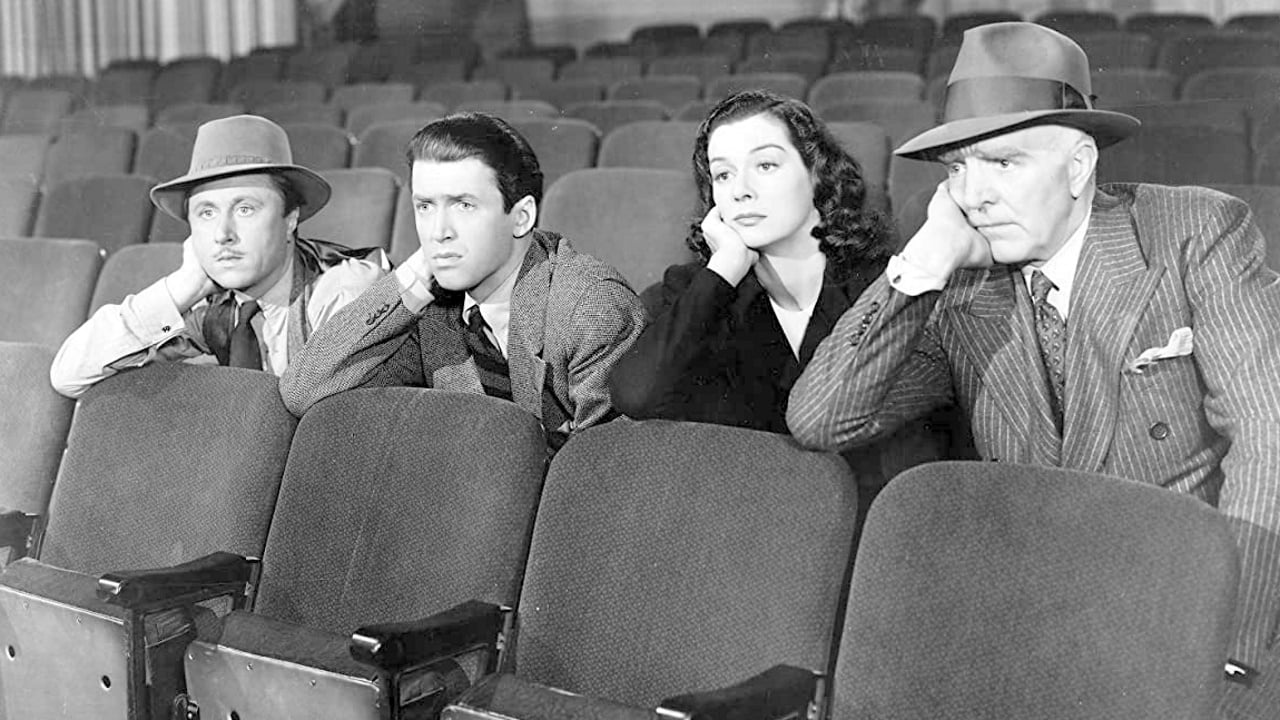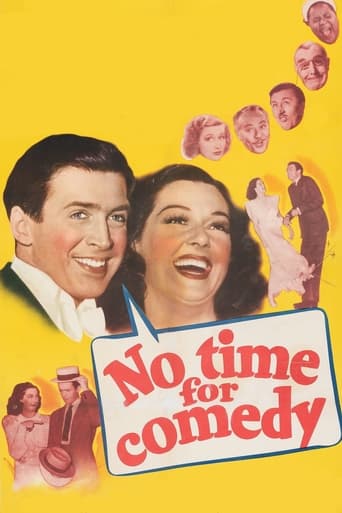



People are voting emotionally.
It really made me laugh, but for some moments I was tearing up because I could relate so much.
View MoreIf you like to be scared, if you like to laugh, and if you like to learn a thing or two at the movies, this absolutely cannot be missed.
View MoreGreat example of an old-fashioned, pure-at-heart escapist event movie that doesn't pretend to be anything that it's not and has boat loads of fun being its own ludicrous self.
View MoreIf you are a James Stewart fan, this is a film to avoid. It starts with his stupid character Playwright Gaylord 'Gay' Esterbrook, who is a combination of Peter Morgan Jr (His character in "Vivacious Lady" who marries entertainer Francey (Ginger Rogers) on his first trip to New York), Jefferson Smith from "Mr. Smith Goes To Washington", and David Graham (The killer in "After The Thin Man). If you have seen these films, you know that they are very naive characters who are not what anyone expects (Particularly at the end). Here he marries actress Linda Paige (Rosaland Russell), also on his first trip to New York. However, he becomes a nasty, drunken, cynical character who cheats on Linda with 'Mandy' Swift (Genevieve Tobin), and becomes the exact opposite of his Jefferson Smith character. In fact, becomes a hater to the degree of Graham (Who really despises Selma Landis( Elissa Landi) to the extent of framing her for murder, while being a spineless weasel). The only reason this film does not get zero stars is Russell (Although I certainly preferred Rogers (And the supporting cast) in "Vivacious Lady"). I even wonder if they used the word "Gay" in the homosexual context back in 1940, because you think of gay, cynical and drunk (Sometimes together) and playwright in the same context. NOT terms you use to describe Jimmy Stewart. In other words, Stewart fans... Avoid.
View MoreRosalind Russell and James Stewart are husband and wife in "No Time for Comedy," a 1940 film also starring Charles Ruggles, Genevieve Tobin, Louise Beavers and Allyn Joslyn. It's based on the Broadway hit that starred Katharine Cornell and Laurence Olivier in one of his early lead roles in the U.S. This was the play, according to legend, that David O. Selznick arranged for Olivier to star in so he would be separated from Vivien Leigh while she was doing "Gone with the Wind." Russell is the glamorous stage star Linda Paige who is starring in a drawing room comedy by one Gaylord Esterbrook (Stewart). He's actually from the sticks, and the play is not without its problems. When the production loses its backer, Paige steps in and saves the show. Bumpkin Esterbrook becomes a lauded playwright and marries Paige. He writes comedies with starring roles for her. One day he meets Mandy Swift, a socialite who likes to, shall we say, take young men under her wing and mold them. She convinces Gaylord that he needs to write some serious drama. Since he's already doing some serious drinking, it stands to reason one should follow the other.Not having seen the original play, it's hard to say whether the film matches up to the original. At the time of the film, Spain was involved in a civil war, and all of Europe threatened by the Nazis; war was imminent. The play is about a playwright who is agonized by his success in the genre of sophisticated comedies when the world is such a serious place. It's also about several years into a marriage when the bloom has fallen off the rose.The film "No Time for Comedy" is an uneasy mix of drama and comedy. Stewart, who normally plays a likable character, plays a country boy spoiled by success. He turns to drink and another woman, making him much less likable. Yet the audience is set up from the beginning to think he's going to be a nice guy. Russell, of course, plays the stage actress (which she was) beautifully. As Gaylord's suffering wife, she is dignified and sophisticated and you can see her broken heart beneath the veneer. Louise Beavers is fabulous as the maid who is not only an equal in the household but acts on stage as well.Part of the problem with "No Time for Comedy" is that nowadays, we know the importance of comedy in times of tragedy. In fact, it's always time for comedy, never more than when there's a dark pall over the world. Despite good performances, the movie seems dated today, as I suspect would the play.
View MoreThis is a fascinating picture for Stewart fans. Made after "Mr. Smith Goes to Washington" and in the same year as "The Philadelphia Story," "No Time" adds an interesting pre-war wrinkle to Stewart's on screen persona. At a time when he was most associated with the "aw-shucks" stereotype of the All-American naif, his Gaylord Esterbrook must have come as a shock to movie-going audiences. Gaylord begins as another one of Stewart's lovable rubes, but by picture's end he's become a cynical sophisticate - and Stewart's handling of the transformation is seamless. He's surprisingly good at playing the gruff curmudgeon and a man on the verge of an extra-marital affair - another atypical Stewart-like development. Likewise, the film itself mirrors Gaylord's personal and artistic transformation, beginning as a typically bubbly romantic comedy but turning bitingly (yet still amusingly) sour by the second act. After a series of comeuppances, Gaylord comes up against his limitations and the final scene -- a confession of humility delivered as a monologue to a seemingly non-existent audience -- is truly moving in the tradition of some of Stewart's finest moments. Lovely.
View MoreSuccessful comic playwright Jimmy Stewart decides that the times he is living in call for political drama instead of laughs. His stage star wife disagrees and must win him back from the clutches of the pretentious matron who has him in her thrall. Though one would think that the tall, lanky duo of Stewart and Rosalind Russell would be perfect together, they disappoint. They manage some charm and chemistry in the early parts of the film, but both surrender to stridency later on, and this movie has none of the fast pace or glossy sheen a sophisticated comedy set in Manhattan should have.What is interesting here is the cultural mirror of the times. The amusing portrait of a cynical Manhattan is still recognizable, and the thesis that in bad times there is nothing more important than making people laugh is the same one Preston Sturges explored in his overrated SULLIVAN'S TRAVELS a year or so later. Though this film doesn't mix comedy and message drama as well as Sturges did, however imperfectly, the penultimate scene here is intriguing. Russell is prepared to marry the droll plutocrat whose wife has stolen Stewart from her, but he lets loose with a string of invective that probably accurately reflected the 'America First' Republicanism of the time. Russell decides that she'd rather be with a man who hates the fact that the free world was being taken over by fascists than by a man who sees all dictators with cynical detachment.This film is heavy and crude where it should be light, and the implied sexual sophistication of the plot is not directed or played with the right tone at all. But this misfire will still manage to be of interest to some.
View More